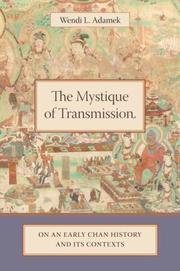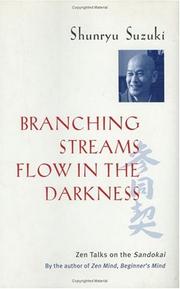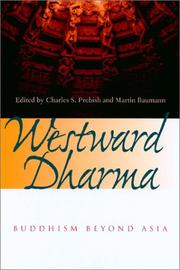| Listing 1 - 10 of 11 | << page >> |
Sort by
|
Book
ISBN: 9811624100 9811624097 Year: 2021 Publisher: Gateway East, Singapore : Springer,
Abstract | Keywords | Export | Availability | Bookmark
 Loading...
Loading...Choose an application
- Reference Manager
- EndNote
- RefWorks (Direct export to RefWorks)
Dharma (Buddhism) --- Buddhist teachings --- Dhamma (Buddhism) --- Buddhism --- Doctrines
Book
ISBN: 9780300216226 030021622X 9780300205183 030020518X 9780300224344 0300224346 Year: 2015 Publisher: New Haven
Abstract | Keywords | Export | Availability | Bookmark
 Loading...
Loading...Choose an application
- Reference Manager
- EndNote
- RefWorks (Direct export to RefWorks)
Some twenty-five centuries after the Buddha started teaching, his message continues to inspire people across the globe, including those living in predominantly secular societies. What does it mean to adapt religious practices to secular contexts? Stephen Batchelor, an internationally known author and teacher, is committed to a secularized version of the Buddha's teachings. The time has come, he feels, to articulate a coherent ethical, contemplative, and philosophical vision of Buddhism for our age. After Buddhism, the culmination of four decades of study and practice in the Tibetan, Zen, and Theravada traditions, is his attempt to set the record straight about who the Buddha was and what he was trying to teach. Combining critical readings of the earliest canonical texts with narrative accounts of five members of the Buddha's inner circle, Batchelor depicts the Buddha as a pragmatic ethicist rather than a dogmatic metaphysician. He envisions Buddhism as a constantly evolving culture of awakening whose long survival is due to its capacity to reinvent itself and interact creatively with each society it encounters. This original and provocative book presents a new framework for understanding the remarkable spread of Buddhism in today's globalized world. It also reminds us of what was so startling about the Buddha's vision of human flourishing.
Dharma (Buddhism) --- Buddhism --- Buddhist doctrines --- Buddhist theology --- Lamaist doctrines --- Buddhist teachings --- Dhamma (Buddhism) --- Doctrines. --- Doctrines --- Buddha,
Book
ISBN: 9781469648538 1469648539 9781469648545 1469648547 9781469648514 1469648512 9781469648521 1469648520 9798890856296 Year: 2019 Publisher: Chapel Hill
Abstract | Keywords | Export | Availability | Bookmark
 Loading...
Loading...Choose an application
- Reference Manager
- EndNote
- RefWorks (Direct export to RefWorks)
"Interest in the psychotherapeutic capacity of Buddhist teachings and practices has captured the popular imagination. News media regularly post stories about the neuropsychological study of Buddhist meditative states and applications of "mindfulness" practices in diverse settings including corporate business headquarters, the U.S. military, and university health services. However, Ira Helderman shows, for well over a century investigators, stretching back to James, Jung, and others fascinated by the psychology of religion, have studied the psychological dimensions of Buddhist doctrine. They have influenced the mental health field and shaped common understandings of "Buddhism" for many Americans. Prescribing the Dharma is the first book to focus on psychotherapists themselves. Drawing on extensive fieldwork and in-depth interviews with many clinicians who have been formative in the use of Buddhist ideas and concepts, Helderman looks at how the key categories of 'religion' and 'secularism' operate for such caregivers"--
Dharma (Buddhism) --- Psychotherapists. --- Psychotherapy --- Mental health personnel --- Buddhist teachings --- Dhamma (Buddhism) --- Buddhism --- Religious aspects --- Buddhism. --- Doctrines --- Buddhism and psychoanalysis. --- Dharma (Buddhism). --- Psychology and religion. --- Psychology.
Book
ISBN: 0300227582 0300223234 9780300227581 9780300223231 0300234252 9780300234251 Year: 2017 Publisher: New Haven, CT
Abstract | Keywords | Export | Availability | Bookmark
 Loading...
Loading...Choose an application
- Reference Manager
- EndNote
- RefWorks (Direct export to RefWorks)
An essential collection of Stephen Batchelor's most probing and important work on secular Buddhism As the practice of mindfulness permeates mainstream Western culture, more and more people are engaging in a traditional form of Buddhist meditation. However, many of these people have little interest in the religious aspects of Buddhism, and the practice occurs within secular contexts such as hospitals, schools, and the workplace. Is it possible to recover from the Buddhist teachings a vision of human flourishing that is secular rather than religious without compromising the integrity of the tradition? Is there an ethical framework that can underpin and contextualize these practices in a rapidly changing world? In this collected volume of Stephen Batchelor's writings on these themes, the author explores the complex implications of Buddhism's secularization. Ranging widely-from reincarnation, religious belief, and agnosticism to the role of the arts in Buddhist practice-he offers a detailed picture of contemporary Buddhism and its attempt to find a voice in the modern world.
Buddhism --- RELIGION / Buddhism / General (see also PHILOSOPHY / Buddhist). --- Buddhist doctrines --- Buddhist theology --- Lamaist doctrines --- Doctrines. --- Dharma (Buddhism) --- Buddhist teachings --- Dhamma (Buddhism) --- Doctrines

ISBN: 9780742539266 Year: 2006 Publisher: Lanham, Maryland Rowman & Littlefield Publishers, Inc.
Abstract | Keywords | Export | Availability | Bookmark
 Loading...
Loading...Choose an application
- Reference Manager
- EndNote
- RefWorks (Direct export to RefWorks)
Zen --- Buddhist teachings --- ethics --- venerated doctrines --- Buddhist history --- western Buddhism --- Japanese militarism --- Japan --- nonviolence --- ultranationalism --- Japanese Buddhism --- religion --- 1868-1945 --- world religion --- Zen Buddhism --- japanese religions --- Meiji Restoration
Book
ISBN: 1626259178 9781626259171 9781626259188 1626259186 9781626259164 162625916X Year: 2018 Publisher: Oakland, CA
Abstract | Keywords | Export | Availability | Bookmark
 Loading...
Loading...Choose an application
- Reference Manager
- EndNote
- RefWorks (Direct export to RefWorks)
Dharma (Buddhism) --- Mindfulness-based cognitive therapy. --- Stress management --- Meditation --- Management, Stress --- Health --- MBCT (Mindfulness-based cognitive therapy) --- Cognitive therapy --- Buddhist teachings --- Dhamma (Buddhism) --- Buddhism --- Religious aspects --- Buddhism. --- Therapeutic use. --- Therapeutic use --- Doctrines

ISBN: 0231136641 0231510020 9780231510028 9780231136648 Year: 2007 Publisher: New York, NY
Abstract | Keywords | Export | Availability | Bookmark
 Loading...
Loading...Choose an application
- Reference Manager
- EndNote
- RefWorks (Direct export to RefWorks)
The Mystique of Transmission is a close reading of a late-eighth-century Chan/Zen Buddhist hagiographical work, the Lidai fabao ji (Record of the Dharma-Jewel Through the Generations), and is its first English translation. The text is the only remaining relic of the little-known Bao Tang Chan school of Sichuan, and combines a sectarian history of Buddhism and Chan in China with an account of the eighth-century Chan master Wuzhu in Sichuan. Chinese religions scholar Wendi Adamek compares the Lidai fabao ji with other sources from the fourth through eighth centuries, chronicling changes in the doctrines and practices involved in transmitting medieval Chinese Buddhist teachings. While Adamek is concerned with familiar Chan themes like patriarchal genealogies and the ideology of sudden enlightenment, she also highlights topics that make Lidai fabao ji distinctive: formless practice, the inclusion of female practitioners, the influence of Daoist metaphysics, and connections with early Tibetan Buddhism. The Lidai fabao ji was unearthed in the early twentieth century in the Mogao caves at the Silk Road oasis of Dunhuang in northwestern China. Discovery of the Dunhuang manuscripts has been compared with the discovery of the Dead Sea Scrolls, as these documents have radically changed our understanding of medieval China and Buddhism. A crucial volume for students and scholars, The Mystique of Transmission offers a rare glimpse of a lost world and fills an important gap in the timeline of Chinese and Buddhist history.
Zen Buddhism. --- Religion. --- Religion, Primitive --- Atheism --- Irreligion --- Religions --- Theology --- Chʻan Buddhism --- Dhyāna (Sect) --- Zen --- Zen (Sect) --- Buddhism --- Mahayana Buddhism --- Zen Buddhism --- Buddhist monasticism and religious orders --- Buddhist monks --- Dharma (Buddhism) --- History. --- Historiography. --- Buddhist teachings --- Dhamma (Buddhism) --- Monasticism and religious orders, Buddhist --- Monasticism and religious orders, Lamaist --- Buddhist monasteries --- Buddhist sanghas --- Doctrines

ISBN: 052093623X 1280095008 1597345105 9786613520432 9780520936232 0520219821 9780520219823 9781280095009 9781597345101 6613520438 Year: 1999 Publisher: Berkeley University of California Press
Abstract | Keywords | Export | Availability | Bookmark
 Loading...
Loading...Choose an application
- Reference Manager
- EndNote
- RefWorks (Direct export to RefWorks)
When Shunryu Suzuki Roshi's Zen Mind, Beginner's Mind was published in 1972, it was enthusiastically embraced by Westerners eager for spiritual insight and knowledge of Zen. The book became the most successful treatise on Buddhism in English, selling more than one million copies to date. Branching Streams Flow in the Darkness is the first follow-up volume to Suzuki Roshi's important work. Like Zen Mind, Beginner's Mind, it is a collection of lectures that reveal the insight, humor, and intimacy with Zen that made Suzuki Roshi so influential as a teacher. The Sandokai-a poem by the eighth-century Zen master Sekito Kisen (Ch. Shitou Xiqian)-is the subject of these lectures. Given in 1970 at Tassajara Zen Mountain Center, the lectures are an example of a Zen teacher in his prime elucidating a venerated, ancient, and difficult work to his Western students. The poem addresses the question of how the oneness of things and the multiplicity of things coexist (or, as Suzuki Roshi expresses it, "things-as-it-is"). Included with the lectures are his students' questions and his direct answers to them, along with a meditation instruction. Suzuki Roshi's teachings are valuable not only for those with a general interest in Buddhism but also for students of Zen practice wanting an example of how a modern master in the Japanese Soto Zen tradition understands this core text today.
Zen Buddhism --- Doctrines. --- Sekito Kisen --- Kisen, Sekito --- 1970. --- beauty. --- buddhism. --- buddhist poetry. --- buddhist teachings. --- buddhists. --- collection of lectures. --- eastern philosophy. --- japan. --- japanese buddhism. --- life journey. --- meditation instructions. --- modern buddhism. --- nonfiction. --- oneness. --- philosophy. --- question and answer. --- religious treatise. --- sandokai. --- soto zen tradition. --- spiritual insight. --- spiritualism. --- spirituality and religion. --- students and teachers. --- western students. --- world religions. --- zen buddhism. --- zen masters. --- zen practices. --- zen teachers. --- zen.
Periodical
Abstract | Keywords | Export | Availability | Bookmark
 Loading...
Loading...Choose an application
- Reference Manager
- EndNote
- RefWorks (Direct export to RefWorks)
Dharma --- Dharma (Buddhism) --- Hinduism --- Buddhism --- Anthropology --- Dharma (Bouddhisme) --- Hindouisme --- Bouddhisme --- Anthropologie --- Anthropology. --- Buddhism. --- Dharma. --- Hinduism. --- Hindu law --- Hindu philosophy --- Adharma (Hinduism) --- Buddha and Buddhism --- Lamaism --- Ris-med (Lamaism) --- Religions --- Human beings --- Buddhist teachings --- Dhamma (Buddhism) --- Brahmanism --- Prayer-books and devotions --- Tibetan --- Doctrines --- Primitive societies

ISBN: 1282359592 1597349941 9786612359590 0520936582 9780520936584 1417522887 9781417522880 9780520226258 0520226259 9780520234901 0520234901 9781597349949 0520226259 0520234901 9781282359598 Year: 2002 Publisher: Berkeley University of California Press
Abstract | Keywords | Export | Availability | Bookmark
 Loading...
Loading...Choose an application
- Reference Manager
- EndNote
- RefWorks (Direct export to RefWorks)
The first authoritative volume on the totality of Buddhism in the West, Westward Dharma establishes a comparative and theoretical perspective for considering the amazing variety of Buddhist traditions, schools, centers, and teachers that have developed outside of Asia. Leading scholars from North America, Europe, South Africa, and Australia explore the plurality and heterogeneity of traditions and practices that are characteristic of Buddhism in the West. This recent, dramatic growth in Western Buddhism is accompanied by an expansion of topics and issues of Buddhist concern. The contributors to this volume treat such topics as the broadening spirit of egalitarianism; the increasing emphasis on the psychological, as opposed to the purely religious, nature of practice; scandals within Buddhist movements; the erosion of the distinction between professional and lay Buddhists; Buddhist settlement in Israel; the history of Buddhism in internment camps; repackaging Zen for the West; and women's dharma in the West. The interconnections of historical and theoretical approaches in the volume make it a rich, multi-layered resource.
Globalization --- Buddhism --- Buddha and Buddhism --- Lamaism --- Ris-med (Lamaism) --- Religions --- Religious aspects --- Buddhism. --- History --- Missions --- History. --- Buddhism - Missions - History --- Buddhism - History - 20th century --- Globalization - Religious aspects - Buddhism --- asia. --- australia. --- buddhism scholars. --- buddhism. --- buddhist practices. --- buddhist studies. --- buddhist teachings. --- buddhist traditions. --- comparative religions. --- dharma. --- diaspora. --- egalitarianism. --- ethics. --- europe. --- global religion. --- history of buddhism. --- israel. --- north america. --- psychology. --- religious philosophy. --- religious scholars. --- south africa. --- theoretical approach. --- theoretical perspective. --- western buddhists. --- western philosophy. --- western thought. --- western world. --- zen.
| Listing 1 - 10 of 11 | << page >> |
Sort by
|

 Search
Search Feedback
Feedback About UniCat
About UniCat  Help
Help News
News